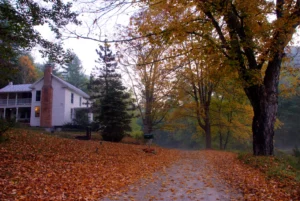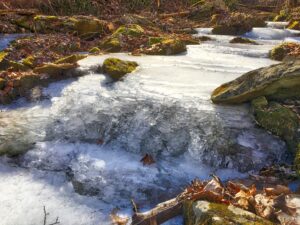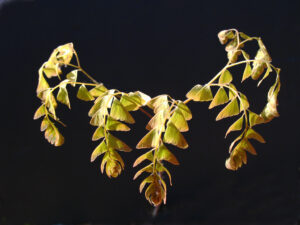Though a few poetic souls and tree-hugging types like me will make soft cooing noises of approval about the magic of the coming of fall, many (beyond a glance out the window at the changing leaves) pay no mind to this transformation at all.
For most of my fellow humans, from a practical, survival point of view, autumn connotes no more inconvenience than the donning of a warmer pair of slippers of a morning and a welcome divorce soon from the lawn mower, till Autumn us do part.
Our pragmatic species has found clever ways to sidestep the potential loss of body heat when the planet in our top half of the world tips away from the heat source for six months.
Those evasive measures we employ to stay adequately warm are called food, clothing and shelter. Eat more. Wear more. Stay indoors and turn up the heat! WINTER? Bring it on!

Human types have it easy when the winds howl and chill factors slip towards zero. We simply supplement our body heat with fossilized sunlight in the form of propane or coal or unnatural gas.
We reach for the afghan that granny made when we were born and toss it over our shoulders while we type, all the while drinking steaming hot cocoa that warms us, bellies outward.
Rather than adapt our core physiology in the way that all other plants and animals have been required to do or die, we remake the world to suit our frail mostly-hairless hides.
Except for complaining, humans mostly ignore the coming of colder, shorter days, while every other stoic and uncomplaining northern hemisphere living thing—every single species—will still be around from one fall to the next spring and from one eon to the next only if it has evolved its own survival tricks of biochemistry or behavior against the deadly-serious life-threats that cold brings.
Juices stop flowing from root to shoot. Water in living tissue freezes. Water expands as it cools, so freezing explodes cells. Metabolism slows to a halt when the mercury falls because enzymes and other cellular catalysts fail to work below a certain fixed temperature.
The whole living world, unprepared, would die of exposure. Autumn forebodes a serious change of plans.
Leave town, the birds say: go to the beach! And they gather early and debate loudly their intentions, starting in September. Drain the radiator, cry the broadleaved trees, as they suddenly abort their brittle drab solar panels into a north wind; leaves won’t do so much good when the sun stays low and the days are short anyway.
Dig! Bury yourself in the mud, under bark, deep in the cleft of an overhanging rock, in the hollow of a canker in a big walnut in the shelter of the valley. Find food now, say the rodents—oily nuts, fat-rich seeds, calorie-dense stuff that won’t spoil.
Hoard it, starting when the green fades, and forget picnics on the lawn until the April sun has melted away the last snow. Go into a chilled slumber in a safe place, and stir only after the soil warms and the creeks thaw. Winter is coming! Make ready!
That autumn comes once more is an ancient refrain written in the stars, a matter of cosmic routine, and we, every one, aware or not, join this orchestrated planetary choreography that has an active part in it for us, if we’re willing to be aware and participate.
The first tendrils of wood smoke from the chimney on a September morning and the green, red and gold Mason jars of summer’s produce in the root cellar are signs that those within this household have believed the signals that have told us since early August: it is time to make ready.

With a mix of solemn resolve and thrill of change to come, we stand firm and ready in our places while the world tilts in a slow nod of the planetary pole that will keep the sun low in the south for six months on. It is only fair to give the other half of the planet’s creatures their spring.
So we relinquish our long days and summer wardrobe in cadence with autumn’s alchemy, transforming toad and tulip poplar, cedar waxwing, goldenrod and wing stem, raven and rat snake—and us—towards our winter selves, through whatever movement or metabolism that might require.
And to all of our fellow creatures who share our local habitat and calendar—see you on the other side.

 – Fred First is an author, naturalist, photographer watching Nature under siege since the first Earth Day. Cautiously hopeful. Writing to think it through. Thanks for joining me. Subscribe to My Substack HERE.
– Fred First is an author, naturalist, photographer watching Nature under siege since the first Earth Day. Cautiously hopeful. Writing to think it through. Thanks for joining me. Subscribe to My Substack HERE.


